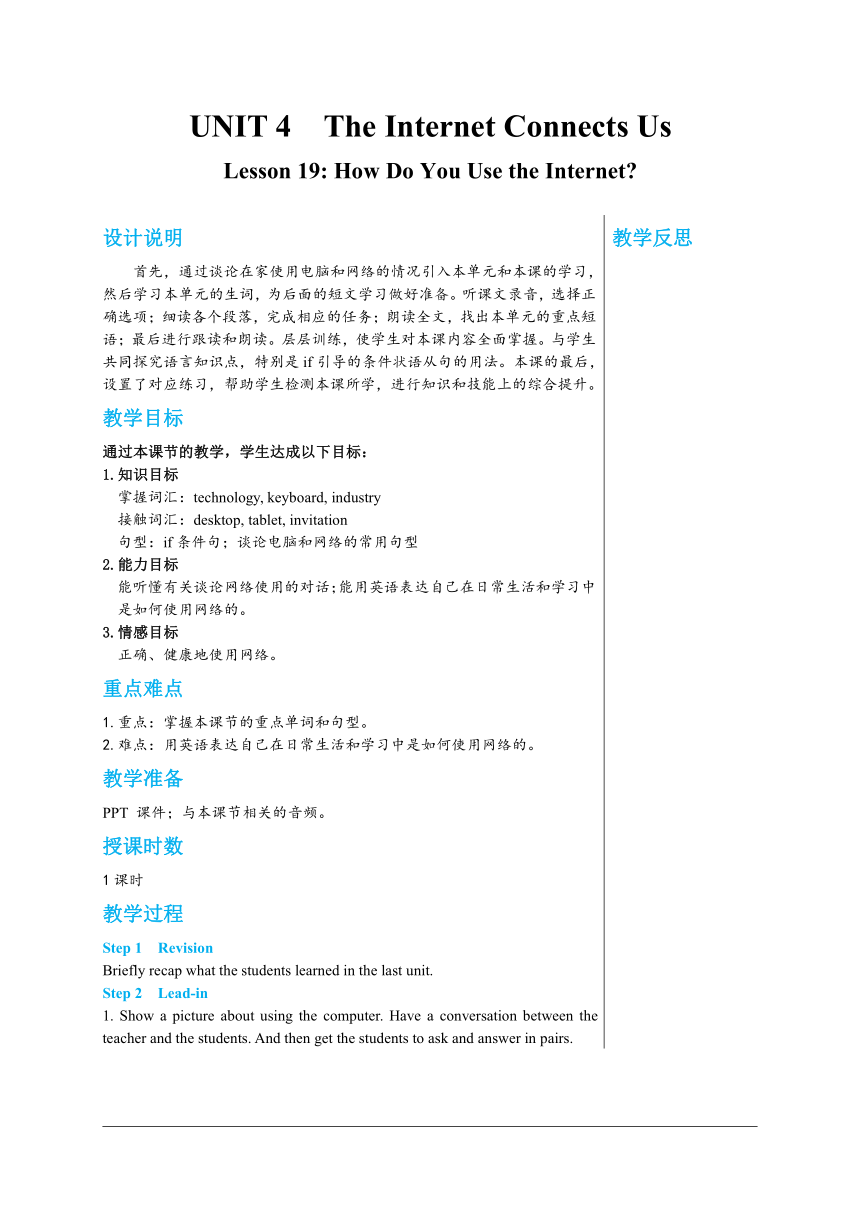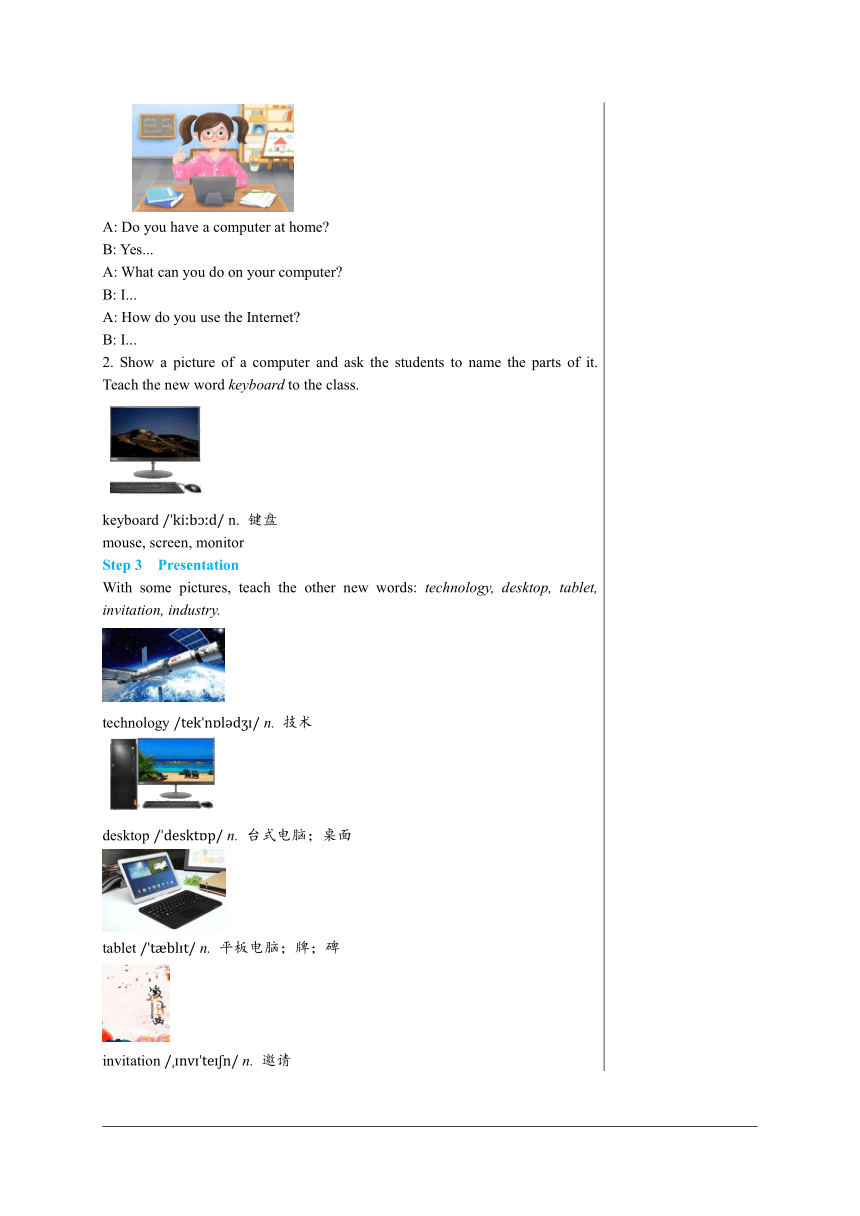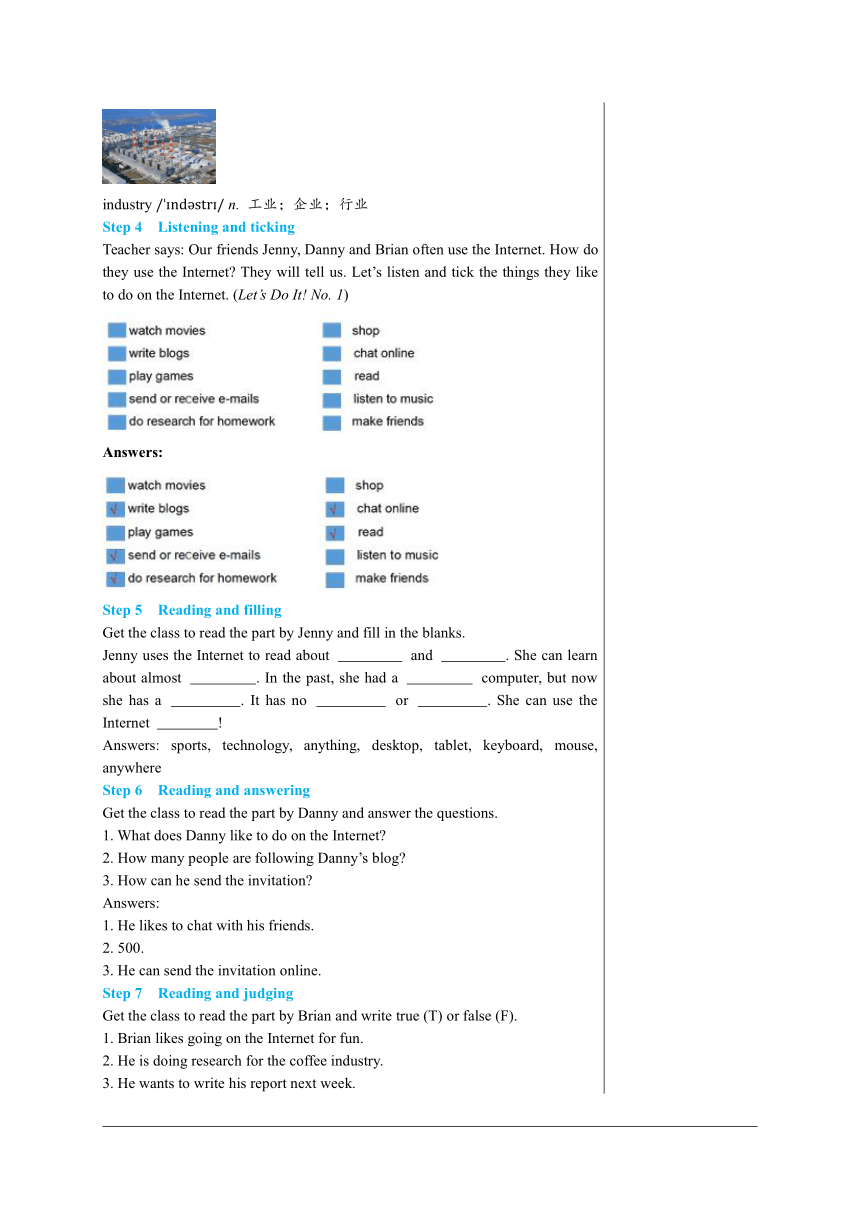UNIT 4 Lesson 19教学详案—冀教版中学英语八年级下
文档属性
| 名称 | UNIT 4 Lesson 19教学详案—冀教版中学英语八年级下 |

|
|
| 格式 | docx | ||
| 文件大小 | 268.8KB | ||
| 资源类型 | 试卷 | ||
| 版本资源 | 冀教版 | ||
| 科目 | 英语 | ||
| 更新时间 | 2024-02-21 20:15:03 | ||
图片预览



文档简介
UNIT 4 The Internet Connects Us
Lesson 19: How Do You Use the Internet
设计说明 首先,通过谈论在家使用电脑和网络的情况引入本单元和本课的学习,然后学习本单元的生词,为后面的短文学习做好准备。听课文录音,选择正确选项;细读各个段落,完成相应的任务;朗读全文,找出本单元的重点短语;最后进行跟读和朗读。层层训练,使学生对本课内容全面掌握。与学生共同探究语言知识点,特别是if引导的条件状语从句的用法。本课的最后,设置了对应练习,帮助学生检测本课所学,进行知识和技能上的综合提升。 教学目标 通过本课节的教学,学生达成以下目标: 1.知识目标 掌握词汇:technology, keyboard, industry 接触词汇:desktop, tablet, invitation 句型:if条件句;谈论电脑和网络的常用句型 2.能力目标 能听懂有关谈论网络使用的对话;能用英语表达自己在日常生活和学习中是如何使用网络的。 3.情感目标 正确、健康地使用网络。 重点难点 1.重点:掌握本课节的重点单词和句型。 2.难点:用英语表达自己在日常生活和学习中是如何使用网络的。 教学准备 PPT 课件;与本课节相关的音频。 授课时数 1课时 教学过程 Step 1 Revision Briefly recap what the students learned in the last unit. Step 2 Lead-in 1. Show a picture about using the computer. Have a conversation between the teacher and the students. And then get the students to ask and answer in pairs. A: Do you have a computer at home B: Yes... A: What can you do on your computer B: I... A: How do you use the Internet B: I... 2. Show a picture of a computer and ask the students to name the parts of it. Teach the new word keyboard to the class. keyboard / ki b d/ n. 键盘 mouse, screen, monitor Step 3 Presentation With some pictures, teach the other new words: technology, desktop, tablet, invitation, industry. technology /tek n l d / n. 技术 desktop / deskt p/ n. 台式电脑;桌面 tablet / t bl t/ n. 平板电脑;牌;碑 invitation / nv te n/ n. 邀请 industry / nd str / n. 工业;企业;行业 Step 4 Listening and ticking Teacher says: Our friends Jenny, Danny and Brian often use the Internet. How do they use the Internet They will tell us. Let’s listen and tick the things they like to do on the Internet. (Let’s Do It! No. 1) Answers: Step 5 Reading and filling Get the class to read the part by Jenny and fill in the blanks. Jenny uses the Internet to read about and . She can learn about almost . In the past, she had a computer, but now she has a . It has no or . She can use the Internet ! Answers: sports, technology, anything, desktop, tablet, keyboard, mouse, anywhere Step 6 Reading and answering Get the class to read the part by Danny and answer the questions. 1. What does Danny like to do on the Internet 2. How many people are following Danny’s blog 3. How can he send the invitation Answers: 1. He likes to chat with his friends. 2. 500. 3. He can send the invitation online. Step 7 Reading and judging Get the class to read the part by Brian and write true (T) or false (F). 1. Brian likes going on the Internet for fun. 2. He is doing research for the coffee industry. 3. He wants to write his report next week. 4. Coffee grows in many countries. 5. Brian’s grandmother likes drinking coffee very much. 6. Brian will send his research to his grandpa by e-mail. Answers: 1. F 2. T 3. F 4. T 5. F 6. T Step 8 Reading, finding and translating Get the class to read the lesson and find the following phrases, and then translate them. 1. use sth. to do sth. 2. used to 3. chat with 4. some of 5. plan to do sth. 6. do research 7. on the Internet 8. work hard 9. begin to do sth. 10. more than 11. send sth. to sb. Answers: 1.使用某物去做某事 2.过去常常 3.与……聊天 4.……中的一些 5.计划做某事 6.进行研究 7.在网上 8.努力工作/学习 9.开始做某事 10.超过 11.给某人发(送)某物 Step 9 Reading 1. Get the class to read the lesson following the recording together. 2. Encourage some of the students to read the lesson. Step 10 Exercises 1. Get the class to focus on the following sentence and repeat it two or three times. If I work hard this evening, I will complete my research. 2. Fill in the blanks with the correct forms of the given verbs. (Let’s do it! No. 2) (1) If you work hard, you’ll (get) there in the end. (2) If you don’t stop him, he will (play) games the whole day. (3) If it (rain) tomorrow, Danny will not go to the supermarket to buy donuts. (4) If you (go) to bed now, I’ll read you a bedtime story. Answers: (1) get (2) play (3) rains (4) go 3. Here is a search homepage. Can you find the information you need Fill in the blanks using the category headings. (Let’s do it! No. 3) 1. A game lover can click on “ ” to play computer games. 2. If I want to improve my spoken English, I’ll go to “ ”. 3. “ ” has some excellent movies. 4. If John wants to know more about China, he will click on “ ”. 5. “ ” helps Jack get information about Oxford University. Answers: 1. Computer & Internet 2. Language 3. Entertainment 4. Society & Culture 5. Education Step 11 Summary Sum up what we’ve learnt in this period with the class. 谈论如何使用网络的句型: 1. I like to use the Internet to ... 2. With the Internet, we can ... 3. I like ... online. 4. I like ... on the Internet. 5. I will ... by e-mail. 6. I can use the Internet ... Step 12 Language points 1. I used to have a desktop computer, but now I have a tablet. 我过去有一台台式电脑,但现在我有一台平板电脑。 used to意为“过去常常”,后接动词原形,表示“过去常常做某事”。 I used to go to bed late, but now I go to bed early. 我过去常常睡觉很晚,但现在我早早去睡觉。 Her father used to teach history in the school. 她的父亲过去在这所学校教历史。 【拓展】be used to意为“习惯于”,to是介词,后接名词、代词或动名词。 My grandparents are used to living in the countryside. 我祖父母习惯住在乡下。 2. I like chatting with my friends online. 我喜欢在网上与我的朋友聊天。 online此处用作副词,意为“在网上地;在线地”。 My mother often buys clothes online. 我母亲经常在网上买衣服。 【拓展】online也可用作形容词,意为“在线的;联网的”。 I like to have online classes a lot. 我非常喜欢上网课。 3. If we want to have a meeting, I can send the invitation online. 如果我们想开会,我可以在网上发出邀请。 (1) 本句是含if引导的条件状语从句的复合句。if作连词,意为“如果”,引导的条件状语从句既可以在主句之前,用逗号隔开,也可以在主句之后。 If you like the two books, you can borrow them. 如果你喜欢这两本书,你可以借阅它们。 【注意】在含if引导的条件状语从句的复合句中,如果主句是一般将来时态,那么从句通常用一般现在时态表将来,即遵循“主将从现”的原则。 If it doesn’t rain tomorrow, we will visit the Great Wall. 如果明天不下雨,我们将去游览长城。 She will come to our party if she is free. 如果她有空,她将来参加我们的聚会。 (2) invitation名词,意为“邀请;邀请函”,其动词形式为invite,意为“邀请”,invite sb. to do sth.意为“邀请某人做某事”,动词不定式作宾语补足语。 Did you get an invitation to the party 你收到聚会的邀请函了吗? Jenny invited me to watch a film with her. 詹妮邀请我和她一起去看电影。 4. I’m collecting information about the coffee industry. 我正在收集有关咖啡行业的信息。 辨析:information, news与message (1) information不可数名词,意为“信息;消息”,通常指通过阅读、查阅或研究等收集或获得的资料、信息等。 We have got some useful information about our report. 我们已获得了一些关于我们报告的有用的信息。 (2) news不可数名词,意为“新闻;消息”,通常指广播、电视、报纸等报道或传播的新闻或口头传播的新鲜事。 What good news it is!多好的消息呀! (3) message可数名词,意为“口信;消息”,通常指口头、书面或通过网络、手机等传递的消息或信息。 Can I take a message for you 我可以给你捎个口信吗? Step 13 Homework 1. Remember the new words and expressions learned in this lesson. 2. Preview Lesson 20. 当堂达标 Ⅰ.根据首字母提示或汉语意思,完成句子 1. I like reading books and magazines about science and (科技). 2. A desktop computer usually has a screen, a mouse and a k . 3. My uncle is writing a report about robot (行业). 4. Her parents bought a new (平板电脑)for her yesterday. 5. I received an (邀请函)to a meeting about space. 6. We are collecting (信息)about winter sports. Ⅱ.根据提示翻译句子 1.我经常在网上与我的朋友们聊天。(online) __________________________________________________ 2.她的母亲过去常常在网上听音乐。(used to) __________________________________________________ 3.如果你努力学习,你就会擅长英语。(if) __________________________________________________ 4.我们将通过电子邮件向王老师发一份邀请函。(send) __________________________________________________ 5.托尼正在网上收集一些关于种植咖啡的信息。(collect) __________________________________________________ 答案: Ⅰ.1. technology 2. keyboard 3. industry 4. tablet 5. invitation 6. information Ⅱ. 1. I often chat with my friends online. 2. Her mother used to listen to music on the Internet. 3. If you work hard, you will be good at English. 4. We will send an invitation to Miss Wang by e-mail. 5. Tony is collecting some information about growing coffee. 板书设计 UNIT 4 The Internet connects us Lesson 19: How Do You Use the Internet technology keyboard industry desktop tablet invitationif引导条件状语从句 If we want to have a meeting, I can send the invitation online. If I work hard this evening, I will complete my research.
教学反思
英语 河北教育版 七年级上 教案,由《中学教材全解》友情提供。祝您工作顺利!
Lesson 19: How Do You Use the Internet
设计说明 首先,通过谈论在家使用电脑和网络的情况引入本单元和本课的学习,然后学习本单元的生词,为后面的短文学习做好准备。听课文录音,选择正确选项;细读各个段落,完成相应的任务;朗读全文,找出本单元的重点短语;最后进行跟读和朗读。层层训练,使学生对本课内容全面掌握。与学生共同探究语言知识点,特别是if引导的条件状语从句的用法。本课的最后,设置了对应练习,帮助学生检测本课所学,进行知识和技能上的综合提升。 教学目标 通过本课节的教学,学生达成以下目标: 1.知识目标 掌握词汇:technology, keyboard, industry 接触词汇:desktop, tablet, invitation 句型:if条件句;谈论电脑和网络的常用句型 2.能力目标 能听懂有关谈论网络使用的对话;能用英语表达自己在日常生活和学习中是如何使用网络的。 3.情感目标 正确、健康地使用网络。 重点难点 1.重点:掌握本课节的重点单词和句型。 2.难点:用英语表达自己在日常生活和学习中是如何使用网络的。 教学准备 PPT 课件;与本课节相关的音频。 授课时数 1课时 教学过程 Step 1 Revision Briefly recap what the students learned in the last unit. Step 2 Lead-in 1. Show a picture about using the computer. Have a conversation between the teacher and the students. And then get the students to ask and answer in pairs. A: Do you have a computer at home B: Yes... A: What can you do on your computer B: I... A: How do you use the Internet B: I... 2. Show a picture of a computer and ask the students to name the parts of it. Teach the new word keyboard to the class. keyboard / ki b d/ n. 键盘 mouse, screen, monitor Step 3 Presentation With some pictures, teach the other new words: technology, desktop, tablet, invitation, industry. technology /tek n l d / n. 技术 desktop / deskt p/ n. 台式电脑;桌面 tablet / t bl t/ n. 平板电脑;牌;碑 invitation / nv te n/ n. 邀请 industry / nd str / n. 工业;企业;行业 Step 4 Listening and ticking Teacher says: Our friends Jenny, Danny and Brian often use the Internet. How do they use the Internet They will tell us. Let’s listen and tick the things they like to do on the Internet. (Let’s Do It! No. 1) Answers: Step 5 Reading and filling Get the class to read the part by Jenny and fill in the blanks. Jenny uses the Internet to read about and . She can learn about almost . In the past, she had a computer, but now she has a . It has no or . She can use the Internet ! Answers: sports, technology, anything, desktop, tablet, keyboard, mouse, anywhere Step 6 Reading and answering Get the class to read the part by Danny and answer the questions. 1. What does Danny like to do on the Internet 2. How many people are following Danny’s blog 3. How can he send the invitation Answers: 1. He likes to chat with his friends. 2. 500. 3. He can send the invitation online. Step 7 Reading and judging Get the class to read the part by Brian and write true (T) or false (F). 1. Brian likes going on the Internet for fun. 2. He is doing research for the coffee industry. 3. He wants to write his report next week. 4. Coffee grows in many countries. 5. Brian’s grandmother likes drinking coffee very much. 6. Brian will send his research to his grandpa by e-mail. Answers: 1. F 2. T 3. F 4. T 5. F 6. T Step 8 Reading, finding and translating Get the class to read the lesson and find the following phrases, and then translate them. 1. use sth. to do sth. 2. used to 3. chat with 4. some of 5. plan to do sth. 6. do research 7. on the Internet 8. work hard 9. begin to do sth. 10. more than 11. send sth. to sb. Answers: 1.使用某物去做某事 2.过去常常 3.与……聊天 4.……中的一些 5.计划做某事 6.进行研究 7.在网上 8.努力工作/学习 9.开始做某事 10.超过 11.给某人发(送)某物 Step 9 Reading 1. Get the class to read the lesson following the recording together. 2. Encourage some of the students to read the lesson. Step 10 Exercises 1. Get the class to focus on the following sentence and repeat it two or three times. If I work hard this evening, I will complete my research. 2. Fill in the blanks with the correct forms of the given verbs. (Let’s do it! No. 2) (1) If you work hard, you’ll (get) there in the end. (2) If you don’t stop him, he will (play) games the whole day. (3) If it (rain) tomorrow, Danny will not go to the supermarket to buy donuts. (4) If you (go) to bed now, I’ll read you a bedtime story. Answers: (1) get (2) play (3) rains (4) go 3. Here is a search homepage. Can you find the information you need Fill in the blanks using the category headings. (Let’s do it! No. 3) 1. A game lover can click on “ ” to play computer games. 2. If I want to improve my spoken English, I’ll go to “ ”. 3. “ ” has some excellent movies. 4. If John wants to know more about China, he will click on “ ”. 5. “ ” helps Jack get information about Oxford University. Answers: 1. Computer & Internet 2. Language 3. Entertainment 4. Society & Culture 5. Education Step 11 Summary Sum up what we’ve learnt in this period with the class. 谈论如何使用网络的句型: 1. I like to use the Internet to ... 2. With the Internet, we can ... 3. I like ... online. 4. I like ... on the Internet. 5. I will ... by e-mail. 6. I can use the Internet ... Step 12 Language points 1. I used to have a desktop computer, but now I have a tablet. 我过去有一台台式电脑,但现在我有一台平板电脑。 used to意为“过去常常”,后接动词原形,表示“过去常常做某事”。 I used to go to bed late, but now I go to bed early. 我过去常常睡觉很晚,但现在我早早去睡觉。 Her father used to teach history in the school. 她的父亲过去在这所学校教历史。 【拓展】be used to意为“习惯于”,to是介词,后接名词、代词或动名词。 My grandparents are used to living in the countryside. 我祖父母习惯住在乡下。 2. I like chatting with my friends online. 我喜欢在网上与我的朋友聊天。 online此处用作副词,意为“在网上地;在线地”。 My mother often buys clothes online. 我母亲经常在网上买衣服。 【拓展】online也可用作形容词,意为“在线的;联网的”。 I like to have online classes a lot. 我非常喜欢上网课。 3. If we want to have a meeting, I can send the invitation online. 如果我们想开会,我可以在网上发出邀请。 (1) 本句是含if引导的条件状语从句的复合句。if作连词,意为“如果”,引导的条件状语从句既可以在主句之前,用逗号隔开,也可以在主句之后。 If you like the two books, you can borrow them. 如果你喜欢这两本书,你可以借阅它们。 【注意】在含if引导的条件状语从句的复合句中,如果主句是一般将来时态,那么从句通常用一般现在时态表将来,即遵循“主将从现”的原则。 If it doesn’t rain tomorrow, we will visit the Great Wall. 如果明天不下雨,我们将去游览长城。 She will come to our party if she is free. 如果她有空,她将来参加我们的聚会。 (2) invitation名词,意为“邀请;邀请函”,其动词形式为invite,意为“邀请”,invite sb. to do sth.意为“邀请某人做某事”,动词不定式作宾语补足语。 Did you get an invitation to the party 你收到聚会的邀请函了吗? Jenny invited me to watch a film with her. 詹妮邀请我和她一起去看电影。 4. I’m collecting information about the coffee industry. 我正在收集有关咖啡行业的信息。 辨析:information, news与message (1) information不可数名词,意为“信息;消息”,通常指通过阅读、查阅或研究等收集或获得的资料、信息等。 We have got some useful information about our report. 我们已获得了一些关于我们报告的有用的信息。 (2) news不可数名词,意为“新闻;消息”,通常指广播、电视、报纸等报道或传播的新闻或口头传播的新鲜事。 What good news it is!多好的消息呀! (3) message可数名词,意为“口信;消息”,通常指口头、书面或通过网络、手机等传递的消息或信息。 Can I take a message for you 我可以给你捎个口信吗? Step 13 Homework 1. Remember the new words and expressions learned in this lesson. 2. Preview Lesson 20. 当堂达标 Ⅰ.根据首字母提示或汉语意思,完成句子 1. I like reading books and magazines about science and (科技). 2. A desktop computer usually has a screen, a mouse and a k . 3. My uncle is writing a report about robot (行业). 4. Her parents bought a new (平板电脑)for her yesterday. 5. I received an (邀请函)to a meeting about space. 6. We are collecting (信息)about winter sports. Ⅱ.根据提示翻译句子 1.我经常在网上与我的朋友们聊天。(online) __________________________________________________ 2.她的母亲过去常常在网上听音乐。(used to) __________________________________________________ 3.如果你努力学习,你就会擅长英语。(if) __________________________________________________ 4.我们将通过电子邮件向王老师发一份邀请函。(send) __________________________________________________ 5.托尼正在网上收集一些关于种植咖啡的信息。(collect) __________________________________________________ 答案: Ⅰ.1. technology 2. keyboard 3. industry 4. tablet 5. invitation 6. information Ⅱ. 1. I often chat with my friends online. 2. Her mother used to listen to music on the Internet. 3. If you work hard, you will be good at English. 4. We will send an invitation to Miss Wang by e-mail. 5. Tony is collecting some information about growing coffee. 板书设计 UNIT 4 The Internet connects us Lesson 19: How Do You Use the Internet technology keyboard industry desktop tablet invitationif引导条件状语从句 If we want to have a meeting, I can send the invitation online. If I work hard this evening, I will complete my research.
教学反思
英语 河北教育版 七年级上 教案,由《中学教材全解》友情提供。祝您工作顺利!
同课章节目录
- Unit 1 Spring Is Coming
- Lesson 1 How's the weather?
- Lesson 2 It's Getting Warmer!
- Lesson 3 Sun Is Rising
- Lesson 4 The Spring City
- Lesson 5 Babysitting on a Spring Day
- Lesson 6 Stories about Spring
- Unit 2 Plant a Plant
- Lesson 7 Planting Trees
- Lesson 8 Why Are Plants Important?
- Lesson 9 Gardening with Mary
- Lesson 10 Make Your Garden Grow!
- Lesson 11 Amazing Plants
- Lesson 12 Danny's Plant
- Unit 3 Animals Are Our Friends
- Lesson 13 Danny's Big Scare
- Lesson 14 Amazing Animals
- Lesson 15 The Zoo Is Open
- Lesson 16 The Pear Escaped
- Lesson 17 Save the Tigers
- Lesson 18 Friendship Between Animals
- Unit 4 The Internet Connects Us
- Lesson 19 How Do You Use the Internet?
- Lesson 20 A Computer Helps!
- Lesson 21 Books or Computers?
- Lesson 22 Travel on the Internet
- Lesson 23 The Internet--Good or Bad?
- Lesson 24 An E-mail to Grandpa
- Unit 5 Buying and Selling
- Lesson 25 Raising Money
- Lesson 26 Cookies, Please!
- Lesson 27 Business English
- Lesson 28 Ms. Liu's Great Idea
- Lesson 29 How to Push a Product
- Lesson 30 A Cookie Sale
- Unit 6 Be a Champion!
- Lesson 31 Don't Fall, Danny
- Lesson 32 My Favourite Record
- Lesson 33 2800 Years of Sports
- Lesson 34 Modern Olympics
- Lesson 35 The Dream Team
- Lesson 36 Classroom Olympics
- Unit 7 Know Our World
- Lesson 37 Let's Learn Geography!
- Lesson 38 The World Is a Big Place
- Lesson 39 Ring Up or Call?
- Lesson 40 Body Language
- Lesson 41 A Class of the World
- Lesson 42 North America
- Unit 8 Save Our World
- Lesson 43 Let's Clean Up!
- Lesson 44 Environment Clubs
- Lesson 45 Let's Sort Garbage!
- Lesson 46 Protect Our Environment
- Lesson 47 Connected to Nature
- Lesson 48 Garbage Is Interesting!
